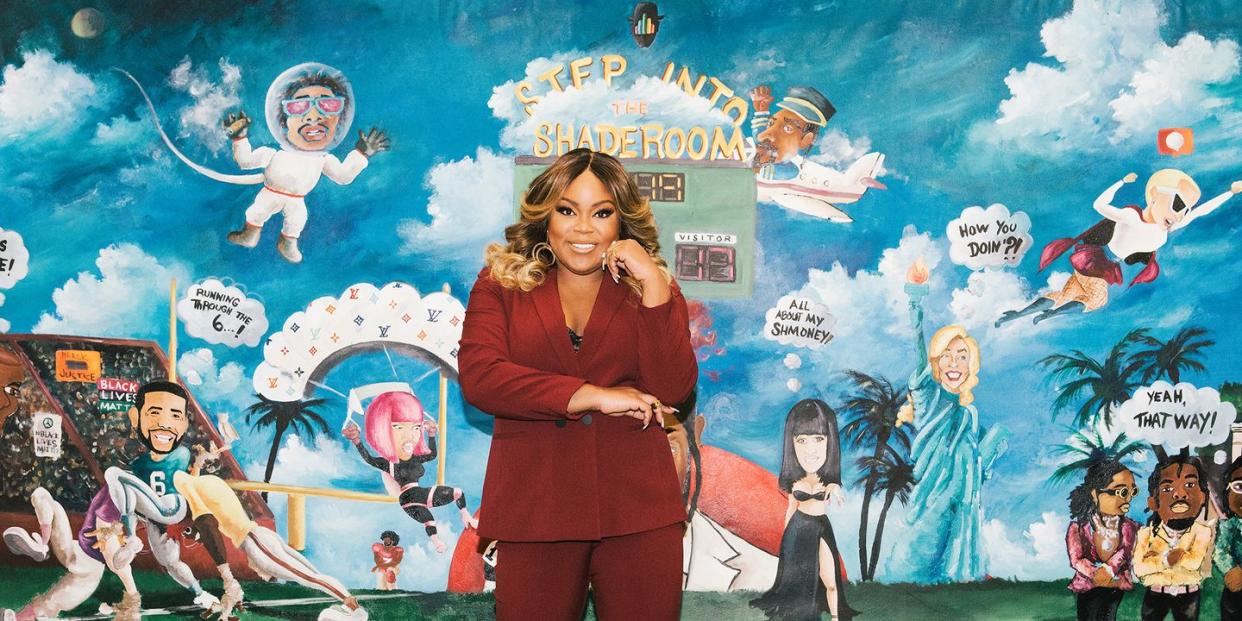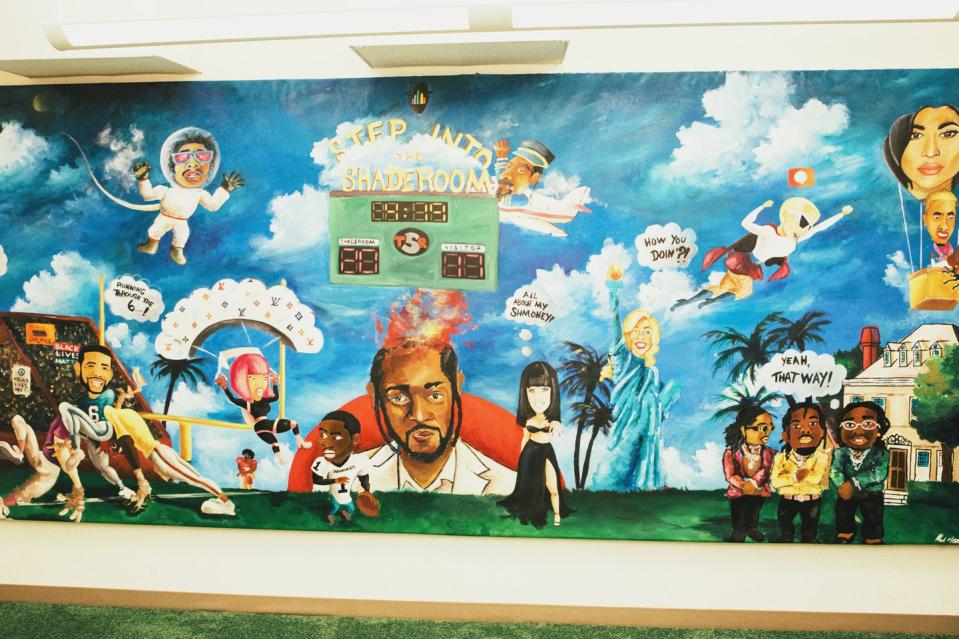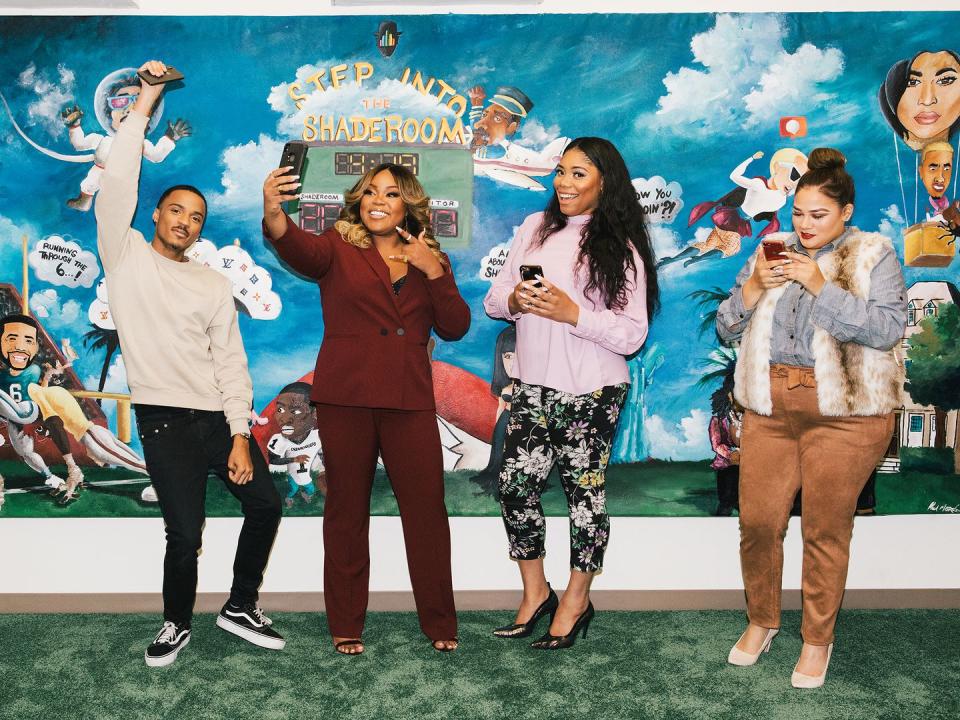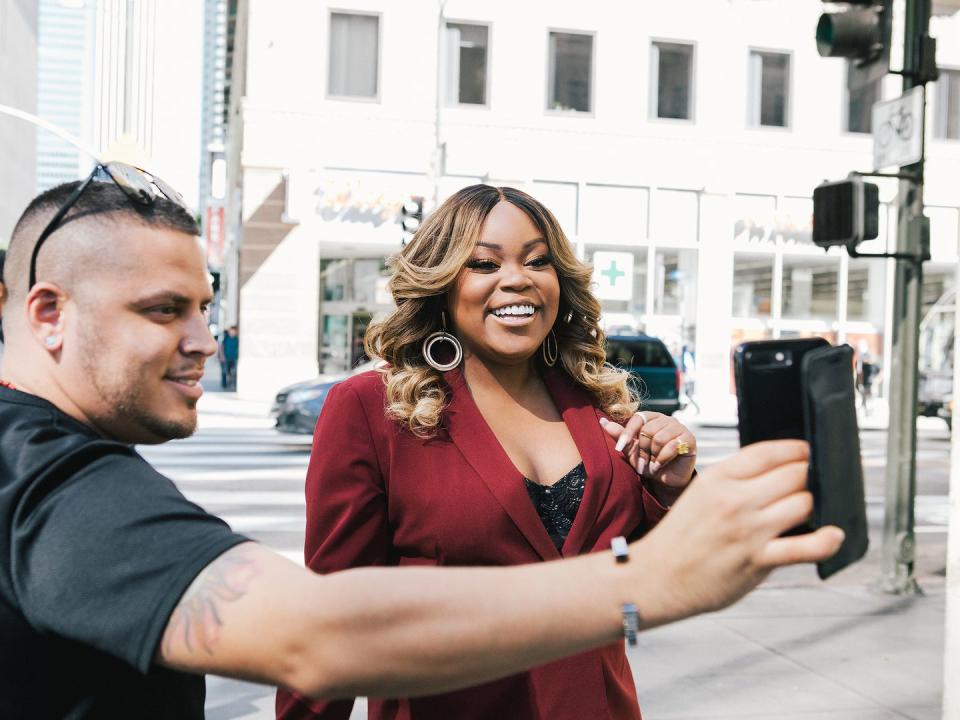The Shade Room Is Ruthless, Uplifting and Unapologetically Black

About a year ago, The Shade Room founder Angie Nwandu received a tip. It was a juicy one. A Roommate, the moniker given to members of The Shade Room community, passed along footage from a birthday party. An important party, the sort you really only read about in celebrity weeklies or, well, The Shade Room. The video showed two siblings-"Really, really high up, big celebrities, right?" Nwandu says-snorting lines of cocaine right next to their mother, a celebrity in her own right. The footage, the kind that TMZ reporters might poison Harvey Levin's massive water bottle for, created a conundrum for the Instagram-based culture and news outlet. The clip would get clicks, but at what cost?
In the end, Nwandu never posted the video. “You don't want to ruin their job,” she tells me over fried rice and noodles at The Shade Room office. “I don’t know. It would affect their career and they had invited us to that same birthday party so it felt weird.”
High-stakes celebrity negotiations have become business as usual for Nwandu, age 28, who started The Shade Room in 2014 while unemployed and thus freed up to text her friends the latest superstar breakups at lightspeed. With their group chats clogged, her friends suggested she use her newfound time and energy to start her own gossip blog. The Shade Room was born. Print media was still trying to figure out exactly how to transition to digital (or shutting down completely), and Nwandu was meeting readers where they were (and are)-endlessly thumbing through Instagram.
The Shade Room fundamentally changed how pop culture news is delivered, consumed, and interacted with. At the same time, Nwandu created a unique and distinctly Black voice in pop culture news. A community-sourced mix of celebrity gossip (star-powered feuds, messy breakups), celebrations of Black excellence, and cultural debates (Should you keep ketchup in the pantry or the fridge?), The Shade Room is an authentic expression of Black culture that can’t be easily imitated. After five years of steady growth in a copycat industry, no other cultural media outlet has come close to its speed, exclusives, and sheer volume of posts and engagement. As of 2018, The Shade Room was the second most popular publisher on Instagram in terms of likes and comments, behind 9GAG, a Hong Kong-based meme account.
It’s a Thursday in September, and Nwandu is doing what she does best: spilling metaphorical tea. She’s been up since 6:33 am, the time she wakes up every day and a reference to the bible verse Matthew 6:33. (“But seek first his kingdom and his righteousness, and all these things will be given to you as well.”) Her mornings consist of prayer at home then private meetings and lunches, the occasional glance at her growing inbox. Then she heads into the office located in downtown Los Angeles. By noon, Nwandu has received more than 600 text messages.

Upon entering The Shade Room offices each day, Nwandu is greeted by a gigantic mural of a scene from a high school football game. The players are familiar: Drake and Lil Yachty are squabbling in the corner, Colin Kaepernick takes a knee, and a hot air balloon of Kylie Jenner’s face floats skyward as Travis Scott and Tyga fight inside. The scoreboard shows The Shade Room up over the Visitors, 20 to 17.
The game is pointedly not an easy win. Nwandu says the score is a reminder that she needs to keep her foot on the gas pedal, break stories before other sites, and serve the community a highlight reel of the day’s greatest hits with a variety of Black-first content.
The day before our interview, The Shade Room broke the news of Diddy and Cassie’s breakup. A few hours later the same day, Nwandu had a meeting with Diddy. “I walked into the office and I said, ‘Listen, let me apologize immediately and let you know that it’s a curse,’” she recalls. “Every time I meet a celebrity, something breaks.” Diddy, in Diddy fashion, took the post in stride, noting he cares very little about what people write about him.
Diddy’s breakup was just one of the 40 to 70 stories that The Shade Room posts to Instagram each day, in the signature Shade Room tone, which Nwandu defines as “Kool-Aid in a wine glass.” The captions read like group texts from your chattiest friends, with layers of inside jokes and slang that separate those in the know from those who aren’t. “Y’all know I keep my ears in the streets and @LoveBScott brought up that their relationship has been low key a wrap, today Cassie’s rep confirmed to us that they have indeed broken up and “sources” say they have been broken up for months now!,” explained The Shade Room caption. “Both Cassie and Diddy are out here winning so I’m sure they’ll be boo’d up with someone new in no time.”
A post shared by The Shade Room (@theshaderoom) on Oct 17, 2018 at 8:02am PDT
The Shade Room captions feel organic thanks to Nwandu’s editorial staff of 7 cool in-the-know kids, each of whom posts on behalf of The Shade Room. Employees uses their personal handle to sign off on each post, an attempt to help her employees build their own personal followings and let the Roommates, the most important players in this game, create a connection with the editors. In 2017, a young Roommate started an unofficial offshoot of The Shade Room dedicated to teens. Nwandu was so impressed by the young entrepreneur’s page that she hired them to the staff. The Shade Room Teen fans go by the name #TSRTeaMates instead of Roommates and are an army of 678k strong who lead the youth shade vertical.
Nwandu says The Shade Room “exists to serve the Black community.” A recurring feature called Black Love spotlights beautiful Black relationships, and #TSRDaddyDuties, a franchise, serves to showcase active fathers in the Black community. That might seem at odds with some of the less-than-excellent celebrity gossip, but Nwandu likens The Shade Room to your cousin’s or Auntie’s house, where everyone’s dirty laundry gets aired. “If you’re doing bad, if you had a baby, or whatever it is, your shit is put on blast,” says Nwandu. As someone who has had an Auntie tell me I needed to fix my teeth, my hair, and my life after one holiday visit at the tender age of eleven, I get it. It’s not a site for the faint of heart but it is one for the culture. Even the shade in The Shade Room is uniquely Black.
#TSRDaddyDuties: #Tyrese posted up with his adorable baby girl ❤️
A post shared by The Shade Room (@theshaderoom) on Jan 16, 2019 at 5:21am PST
The Shade Room’s “I drag you because I love you” approach sparked a recent controversy with rapper Cardi B, who officially declared she does not mess with The Shade Room this December. People don’t mess with The Shade Room and for good reason. Cardi complained that the page didn’t post any positive news about the rapper and her comments on posts were deleted. At the height of her feud with Nicki Minaj, Cardi accused The Shade Room of deleting her responses to stories by employee (and Minaj superfan) Kyle Anfernee. Anfernee has since left The Shade Room and has started his own news website called the Neighborhood Talk.
#PressPlay: #CardiB announces she and #Offset are no longer together and he responded 👀
A post shared by The Shade Room (@theshaderoom) on Dec 4, 2018 at 10:00pm PST
In early 2018, a nurse saw Kylie Jenner whip past her at Cedars Sinai hospital in Los Angeles. In that moment, the nurse was one of only a few people in the world who knew what would be one of the year’s biggest news stories. Reports of Jenner going into labor hadn't broken yet and no one from the Kardashian-Jenner camp had even confirmed her pregnancy. The nurse was also a Roommate, the beating heart and soul of The Shade Room. And so Nwandu's DMs got a little bit fuller.
The staff vetted the tip, first asked for the hospital and looked to confirm it would match with the youngest Kardashian-Jenner’s last location. Then, they asked for details to confirm the nurse worked in delivery. Did this nurse really work at the hospital? What did she see exactly? Could it just happen to be someone else? They asked other trusted sources in the Kardashian camp and finally, they asked for photos that would indisputably prove Jenner was at Cedars Sinai Medical Hospital in Los Angeles. Unfortunately, the nurse couldn’t provide all the requested details on the story and E! News, home to Keeping Up With The Kardashians, swooped in and got the story.
When The Roommates see something, they say something-and The Shade Room’s DMs are very open. As we’re sitting in Nwandu’s office, she opens up the inbox to reveal thousands of conversations with the Roommates. She responds back to every single message and has since The Shade Room started. “We have a history that goes back for years,” she says, leading to some of The Shade Room’s biggest stories. The Shade Room relies on eagle-eyed Roommates to see who’s liking their ex’s bikini photos, and who tweeted-and-deleted something shady. “We rely on the Roommates a lot, it’s like a crowdsource,” says Nwandu. “If we didn’t have the roommates, we wouldn’t have anything.” Sure, you can call in to a New York Times hotline or comment on Page Six’s Facebook, but The Shade Room is a real community, and its comments section serves as a living document of the news. Celebrities will often dip into the comments to engage with the news, add their two cents, or, if it’s about them, set the record straight.
Guided by the Roommates, The Shade Room lives by its own code of conduct. When asked if she would barter for stories-say, promise not to publish that coke-snorting video if its stars gave The Shade Room a different exclusive-Nwandu says no, never. She will post everything vetted and trusted by her team unless she feels it calls morals in to question. She’ll never out a celebrity, post about children, or any post damaging stories that would do more harm than good. She covers Black issues because Black people vote “a lot and well,” she says, and celebrity gossip that she knows will get conversations started. Plus, the random questions that her office is actually wondering like, when is the ideal time to put deodorant on? Does ketchup belongs in the fridge or the pantry? She doesn’t cover the “craziness”-the White House, unless it directly affects Black people, or Kanye West, because “he’s canceled,” Nwandu says.

The Shade Room has occasionally misstepped on the way to becoming the voice of a culture-and the Roommates have been the first to tell them. In the past, they have advertised skin bleaching products, published things that Gawker in its heyday couldn’t get away with (like a leaked sex tape), and not always supported other minority communities. Nwandu has apologized and taken down several posts because the Roommates told her to. They have said, “We don’t feel like this represents us,” she explains.
With 14.7 M followers, The Shade Room reaches beyond the primarily Black audience it caters to. Nwandu isn’t surprised. “Everything Black starts off Black and becomes a party that everyone’s at,” she says. “Just like hip-hop, R&B, jazz, soul music, soul food, it just Black culture in general that starts off Black and then ends up being a party that everyone wants to be part of. Black culture is so fun, it’s new, it’s fresh. We report on Black culture so it’s natural.”
Still, Black culture sites are almost always where vultures gather to find out which cornrows they shouldn’t be wearing, which tans they shouldn’t be getting, and which words they should start saying. In our chat, Nwandu wants to be clear she does not cater to a white audience. It’s the authentic Blackness and her purposeful lack of pandering to the white audience that prevents white people from making the account about them.
“People have told me to put more white tea on the site,” explains Nwandu. “I’m like, well, they follow it. We can keep doing our focus because this community needs representation. Not just representation, because we have other Black sites but they need it at this level. They need variety in the diversity that we give. We can be ratchet and at the same time posting Black female CEOs. That’s our thing.”

('You Might Also Like',)

